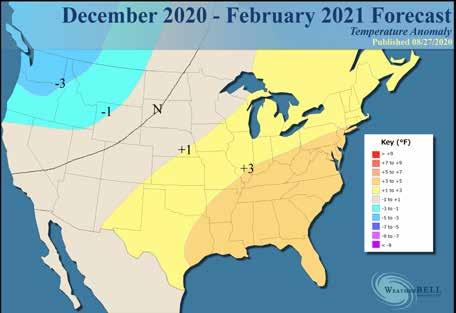
3 minute read
Mark Clark
Mark D. Clark
Trump Administration Regulatory Rollbacks
Advertisement
As we near our quadrennial ritual of electing a president, it seems appropriate to look back at the regulatory revisions that have or may impact the environment and oil and gas operations in one way or another. We have reported on a number of those regulatory changes which generally reduce regulatory burden on the oil and gas industry.
These regulations include: (i) U.S. Environmental Protection Agency's ("EPA") final policy amendments to the 2012 and 2016 NSPS for the oil and gas industry along with final technical amendments to the 2016 NSPS that became effective on August 13, 2020 (see September 2020 IOGA News), (ii) EPA's final rule known as the Navigable Waters Protection Rule (replacing the former Clean Water Rule) that became effective June 22, 2020 (see May and August 2020 IOGA News), and the Council on Environmental Quality rulemaking to relax National Environmental Policy Act ("NEPA") requirements that became effective September 14, 2020 (see February and August 2020 IOGA News). All of these rules are being challenged in court by environmental organizations and state authorities. Spilman Battle & Thomas, PLLC
However, there have been a number of other regulatory developments initiated by the Trump Administration that are too numerous to mention in full, but here are a few of the other efforts at regulatory rollback.
Oil drilling in the Arctic National Wildlife Refuge has been authorized as of August 17, 2020, as a result of the Bureau of Land Management's completion of an environmental impact statement which was adopted by the Secretary of the Interior. This action made the Arctic National Wildlife Refuge available to future exploration, development and transportation. It is not clear whether any leases will be awarded before the end of 2020.
Listing endangered species and designating critical habitat three rule package promulgated by the Fish and Wildlife Services and National Mariners Fisheries Service making it easier to delist endangered or threatened species while increasing requirement for designating critical habitat. These three rules were issued on August 12, 2019, and became effective on September 26, 2019 (see September 2019 IOGA News).
The EPA's Safer Affordable
R.L. Laughlin & Co., Inc “Providing Gas Measurement Services since 1970”
Site Automation Meter Sales Gas Analysis Electronic Chart Integration Meter Installations Calibrations & Repairs
NOW SERVING YOU IN 3 LOCATIONS:
125 State Rt. 43 5012 Washington St., W. Hartville, OH 44632 Charleston, WV 25313 330-587-1230 304-776-7740 Fuel-Efficient Vehicles Rule for model years 2021-2026 passenger vehicles reduces the corporate average fuel efficiency requirements and increases the CO2 emissions standards compared to the Obamaera standards, which would reduce the average price of a new vehicle by about $1,000 and reduce regulatory costs through model year 2029. These rule revisions were finalized by the EPA on March 30, 2020, but are not yet effective.
Rescinding the Clean Fuels Grant Program created under the Federal Transit Administration to assist nonattainment and maintenance areas in achieving or maintaining air quality attainment status, support emerging clean fuel and advanced propulsion technologies for transit buses, and create markets for these technologies. The Clean Fuels Grant Program rollback became effective October 21, 2019.
Rescission of the Clean Power Plan rulemaking was published on October 16, 2017, and was a companion rule to the Affordable Clean Energy Rule which was issued on August 31, 2018, and was intended as a substitute for the Clean Power Plan. The rescission of the Clean Power Plan and the Affordable Clean Energy Rule both became effective on September 6, 2019. However, those rules are the subject of ongoing litigation as are most of the rules mentioned in this article.
Withdrawal of the comprehensive program requiring developers to compensate for their construction and other activities on federal land. The U.S. Fish and Wildlife Service issued the Endangered Species Act Reg Rollbacks Continued on page 14





